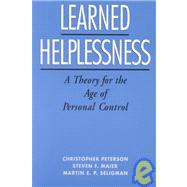
Note: Supplemental materials are not guaranteed with Rental or Used book purchases.
Purchase Benefits
Looking to rent a book? Rent Learned Helplessness A Theory for the Age of Personal Control [ISBN: 9780195044676] for the semester, quarter, and short term or search our site for other textbooks by Peterson, Christopher; Maier, Steven F.; Seligman, Martin E. P.. Renting a textbook can save you up to 90% from the cost of buying.
| Introduction | |
| The Phenomena of Helplessness and Personal Control | |
| The Theory of Learned Helplessness | |
| Three Uses of "Learned Helplessness" | |
| Learned Helplessness: Inward, Downward, and Outward | |
| Why Learned Helplessness Has Been Controversial | |
| Why Learned Helplessness Has Been Popular | |
| Learned Helplessness in Animals | |
| Learned Helplessness Theory | |
| The Controversy | |
| Contiguity Versus Contingency | |
| Representation and Expectation | |
| What We Know | |
| What We Don't Know | |
| The Biology of Learned Helplessness | |
| Norepinephrine | |
| Gamma-Aminobutyric Acid | |
| Endogenous Opiates | |
| Transmitters, Neuromodulators, and Hormones | |
| Corticotrophin Releasing Hormone (CRH) | |
| Issues Omitted | |
| What We Know | |
| What We Don't Know | |
| Learned Helplessness in People | |
| Criteria of Learned Helplessness | |
| Operationalizing Learned Helplessness in the Laboratory | |
| A Meta-Analysis of Human Helplessness Studies | |
| Other Aspects of Human Helplessness | |
| The Generality of Learned Helplessness Among People | |
| Cognition and Self-Report | |
| Other Explanations | |
| What We Know | |
| What We Don't Know | |
| The Attributional Reformulation | |
| Historical Background: Attribution Theory and Theorizing | |
| Causal Explanations and Locus of Control | |
| The Reformulated Learned Helplessness Model | |
| Assessing Explanatory Style | |
| Empirical Studies of Explanatory Style | |
| What We Know | |
| What We Don't Know | |
| Learned Helplessness and Depression | |
| What Is Depression? | |
| The Reformulation of the Learned Helplessness Model of Depression | |
| Modernity and Depression | |
| Controversies | |
| What We Know | |
| What We Don't Know | |
| Learned Helplessness and Social Problems | |
| Survey of Applications | |
| What We Know | |
| What We Don't Know | |
| Learned Helplessness and Physical Health | |
| Some Groundrules | |
| Risk Factors for Illness | |
| Mechanisms | |
| Health and Illness in Animals Versus People | |
| What We Know | |
| What We Don't Know | |
| Epilogue | |
| A Brief History of Choices | |
| The Importance of Control | |
| Learned Helplessness as a Model of Scientific Dispute and Progress | |
| Learned Helplessness and the Age of Personal Control | |
| Optimism Institutes | |
| Table of Contents provided by Publisher. All Rights Reserved. |
The New copy of this book will include any supplemental materials advertised. Please check the title of the book to determine if it should include any access cards, study guides, lab manuals, CDs, etc.
The Used, Rental and eBook copies of this book are not guaranteed to include any supplemental materials. Typically, only the book itself is included. This is true even if the title states it includes any access cards, study guides, lab manuals, CDs, etc.